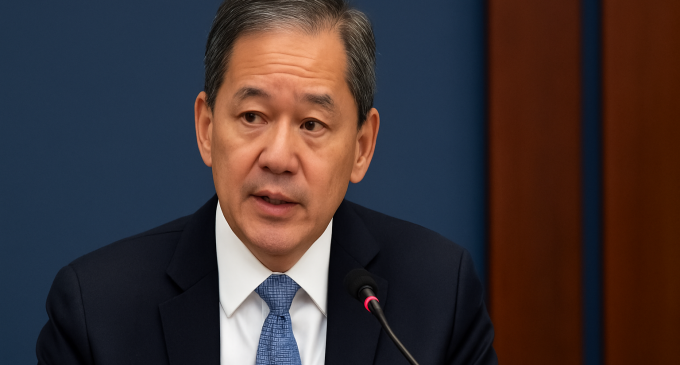
Introduction
In a recent statement, SEC Commissioner Mark Uyeda criticized the push for stricter crypto regulations, calling it a “mistake” that could stifle innovation and market growth. Uyeda expressed concerns that the proposed regulatory measures would create unnecessary hurdles for the digital asset industry, discouraging investment and technological advancements. His comments highlight a growing debate within the SEC regarding how to handle the rapidly evolving crypto sector.
As the U.S. Securities and Exchange Commission continues its efforts to regulate the cryptocurrency industry, Uyeda’s stance adds a new dimension to the discussion. His opposition suggests that not all SEC officials agree on the extent to which crypto firms should be regulated. While some policymakers push for greater oversight, others, like Uyeda, warn against excessive intervention that could drive crypto businesses out of the U.S.
SEC’s Stance On Crypto Regulation
Over the past few years, the SEC has been actively working to establish regulatory frameworks for cryptocurrencies, citing investor protection and financial stability as primary concerns. Under the leadership of SEC Chair Gary Gensler, the agency has taken a more aggressive approach to enforcing securities laws in the crypto space. This has led to lawsuits against major crypto firms, including Coinbase and Binance, for allegedly operating unregistered securities exchanges.
Gensler and other regulators argue that many cryptocurrencies should be classified as securities, requiring them to comply with strict legal frameworks. However, this approach has been met with resistance from industry leaders and policymakers who believe that excessive regulations could stifle innovation. Uyeda’s recent statements add to this resistance, emphasizing the need for a balanced approach.
Uyeda’s Concerns About Overregulation
Uyeda’s primary concern is that excessive regulatory measures could hinder the growth of the cryptocurrency industry rather than provide meaningful investor protection. He argues that instead of enforcing blanket regulations, the SEC should consider more tailored approaches that support both innovation and market integrity.
One of Uyeda’s key criticisms is that the SEC’s current regulatory strategy lacks clarity. Many crypto firms and investors struggle to understand which regulations apply to them, leading to uncertainty and fear of enforcement actions. Uyeda warns that this uncertainty could push companies to relocate to countries with more favorable regulatory environments, ultimately weakening the U.S.’s position as a leader in financial technology.
Additionally, Uyeda suggests that certain proposals, such as expanding the definition of securities exchanges to include decentralized finance (DeFi) platforms, could have unintended consequences. He argues that applying traditional securities laws to DeFi without recognizing its unique characteristics could limit its potential and drive innovation offshore.
The Debate On Crypto Regulation Within The SEC
Uyeda’s opposition highlights the internal divisions within the SEC regarding crypto regulation. While some commissioners support a strict enforcement-first approach, others, like Uyeda, believe that the SEC should focus on providing clearer guidelines before taking action against crypto firms.
This debate reflects broader disagreements within the U.S. government on how to regulate digital assets. Some lawmakers advocate for comprehensive federal legislation that establishes clear rules for the crypto industry, while others prefer to rely on existing securities laws.
Uyeda’s call to drop key proposals suggests that he believes the SEC is overstepping its authority. He argues that regulating crypto requires collaboration between agencies and lawmakers rather than unilateral enforcement actions. This position aligns with industry leaders who have long called for a more open dialogue between regulators and the crypto community.
Impact On The Crypto Industry
Uyeda’s comments could have significant implications for the crypto industry, as they signal potential resistance to certain regulatory proposals within the SEC. If his arguments gain traction, the agency might reconsider some of its stricter regulatory measures.
For crypto businesses, Uyeda’s stance provides hope that not all regulators support an aggressive crackdown. His opposition to overregulation suggests that there is still room for dialogue and potential adjustments to the SEC’s approach. However, it remains unclear whether his views will influence the agency’s overall regulatory strategy.
If the SEC does proceed with its current regulatory push despite Uyeda’s objections, crypto firms may face increased legal battles and compliance challenges. This could lead to further market volatility as investors react to ongoing regulatory uncertainty.
Possible Alternatives To Strict Crypto Regulation
Uyeda’s criticism raises the question of what alternative regulatory approaches could be considered. Instead of imposing strict enforcement measures, regulators could explore the following solutions:
Developing a Clear and Inclusive Regulatory Framework
Rather than applying outdated securities laws to cryptocurrencies, the SEC could work with lawmakers to develop a regulatory framework specifically tailored to digital assets. This would provide legal clarity for crypto firms and investors while ensuring appropriate consumer protections.
Encouraging Innovation Through Regulatory Sandboxes
Several countries have successfully implemented regulatory sandboxes, allowing crypto startups to test their products under regulatory supervision without facing immediate enforcement actions. The U.S. could adopt a similar approach to foster innovation while maintaining oversight.
Promoting International Cooperation on Crypto Regulations
Given the global nature of cryptocurrencies, international cooperation is crucial for effective regulation. Uyeda’s stance suggests that the U.S. should collaborate with other countries to create consistent and balanced regulations rather than imposing strict domestic measures that could isolate the industry.
Distinguishing Between Different Types of Crypto Assets
Not all cryptocurrencies serve the same purpose. Some function as payment systems, while others represent ownership in projects or businesses. Developing distinct regulatory categories for different types of crypto assets could help create more appropriate rules for each sector.
The Future Of Crypto Regulation In The U.S.
As the debate over crypto regulation continues, Uyeda’s objections add to the growing call for a more measured approach. While the SEC remains committed to enforcing securities laws, internal disagreements may lead to adjustments in its strategy.
In the coming months, policymakers, regulators, and industry leaders will likely engage in further discussions on the best path forward for crypto regulation. Whether Uyeda’s views will significantly influence the SEC’s actions remains to be seen, but his statements have certainly fueled the ongoing debate.
For now, crypto businesses and investors should stay informed about regulatory developments and be prepared for potential changes. While stricter regulations remain a possibility, Uyeda’s opposition suggests that there is still room for dialogue and potential revisions to the SEC’s approach.
Conclusion
SEC Commissioner Mark Uyeda’s strong opposition to the current push for stricter crypto regulations reflects the broader divide within the regulatory community. His warning that excessive regulation could harm the industry underscores the need for a balanced approach that fosters innovation while ensuring market integrity.
As the crypto sector continues to evolve, regulators will need to find ways to address risks without stifling growth. Uyeda’s comments serve as a reminder that regulatory decisions should be carefully considered to avoid unintended consequences. Whether his stance will lead to meaningful changes in the SEC’s approach remains uncertain, but it adds a crucial perspective to the ongoing debate about the future of cryptocurrency regulation in the U.S.







There are no comments at the moment, do you want to add one?
Write a comment